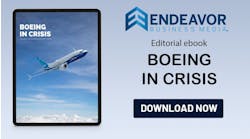Norm Augustine retired in 1997, but not before creating the world’s biggest defense contractor.
Augustine, former chairman and CEO of Lockheed Martin Corp. (IW 500/29), in 1995 orchestrated the merger of Martin Marietta and Lockheed Corp., creating what is now Lockheed Martin.
During the Industrial Research Institute’s 75th annual meeting in D.C., Augustine offered IW some insight on his time leading Lockheed Martin, serving as Undersecretary for the U.S. Army and on the defense industry.
Q: Looking back on your time as CEO, what would you have changed about your leadership style and what do you consider your greatest strengths as a leader?
My greatest strength as a leader was I’m very good at identifying talented people, talented dedicated people. I was always able to surround myself with people who fit those adjectives.
If you’re at a company with 180,000 employees as I was, you don’t make much difference by yourself. It’s “Can you create an environment where everybody else is at their best?” To do that, you’ve got to have people around you that are really talented.
I’m a delegator. I believe in delegating. My 13 words are: “Find good people. Tell them what you want and then leave them alone.”
That’s my management secret. It’ll save you two years, $100,000 at business school, if you do those things.
Surprise of Being a CEO
One of the things that certainly comes to mind that was always an enigma to me was I’ve had trouble holding schedules for meetings and the like.
I had on more than one occasion groups of people sitting outside of my office waiting for the next meeting. And it’s an insult to them.
It’s inefficient and the dilemma is you’re on the topic you’re on. You need 10 more minutes. Do you cut that off and then reassemble that group or do you finish that and have everybody else wait in the hall for 10 minutes? I never found the answer to that.
When I was CEO, there was nothing that really surprised me all that much, with one exception. It was pretty much what I expected, I guess.
The one thing I didn’t realize was the amount of time you would spend in dealing with people wanting the company’s support or the company’s money for very worthy causes. It just occupies a whole lot of your time.
Often, these people are customers that you have to listen to and what they’re doing, every one of them, you think, “Wow, that’s terrific. We’d love to do that.” But it uses an awful lot of the CEO’s time and a lot of this can’t be delegated. Some can but a lot cannot. That was the one thing I was unprepared for.
Q: You are known to be an extensive traveler. How have those travels impacted your approach to leadership?
Travel is broadening, as they say, and it sure is. You see things where people do things well. You see where people do things poorly and you pay attention to it.
When you compare customer service in our country with customer service in many of the other countries I’ve traveled, we come out very badly.
You don’t have to be a rocket scientist to provide good customer service. You just have to focus on it and apparently U.S. companies don’t. You can tell when you go some places you do get good customer service and you go other places you don’t. That’s just one example.
Of course you get to talk to a lot of people. You discover what they think is important and what are they doing. I’ve traveled to 111 countries at this point and every one is different. They all have problems we have. There aren’t as many other places you’d want to live if you had the choice.
Q: How have you seen the strategies of leaders change during your career in business? Have you seen the priorities changing along with them?
I’ve kind of been very fortunate in my life that I worked for great leaders all through my career. I’ve had good bosses. I’ve also gotten to know a lot of people who I think are good leaders.
Sort of what I learned from them as I went along was that there is a certain fundamental group of qualities that a leader has to have. It doesn’t matter what you’re leading, you’d better have those.
No. 1 is integrity. Judgment is awfully important. It’s nice if you’re at least halfway smart and that you work hard.
Microcosm of Life
You see that no matter what people are leading. You find that certain environments require different kinds of leadership. I’ve worked in academia and the private sector and not-for-profits and government and I’ve dealt with the military.
With the military, you get things done by giving orders. At not-for-profits, you don’t get things done by giving orders and the same in academia. Some require persuasion.
But throughout, I’ve just sort of come away with the conclusion that the best form of leadership is where you can persuade people that what you’d like to have done is worth doing and so that they want to do it. And then leave them alone and let them go do it.
One of the big mistakes that some leaders make is they delegate a job and then keep trying to help do the job. You’ve got to watch. You can’t delegate a job and then walk away.
I just recently had a friend get in a fair amount of trouble for doing that. [My friend] delegated the job in a very reasonable fashion but didn’t keep track to see if it was going off of the track until it really crashed. You can’t do that.
I never had a course in leadership…Most of what I learned about leadership was from Boy Scouts and from sports.
Sports has a great feature that it’s a microcosm of life. You don’t have to be a world class athlete; I wasn’t. I always had a ball in my hand. I was okay but not great but I always loved it.
In sports, you learn to lose and get over it. You learn to win and deal with it. You learn to have setbacks. You learn to be part of a team. You learn to work hard. You learn to follow the rules. All keys to life.
The nice part about sports is that if you mess up, it’s not the end of the world. You may think so at the time but in retrospect it’s not. Whereas if you’re Undersecretary of the Army and make a bad decision, it can have consequences. It’s not like calling the wrong play in football.
Q: The effects of the sequester are already being felt. How do you think the cuts are going to impact the defense industry long term?
I think the impact of the sequester is being felt a lot, not just in the defense industry but across the nation. I’ve traveled around and talked to people.
I don’t think they’re being felt, with one exception, so far in any explosive way. That one exception was what happened to the air traffic system.
Unfortunately, I was flying back from Berlin at that time. I went through the true nightmare trip, the last 400 miles of which I did on the train. That was the big one.
What’s happening is we’re being eaten by the mosquitos. It doesn’t elevate enough to where people realize this. We’re eating away at the fabric of the nation.
Example: Dr. Francis Collins, who runs the National Institutes of Health, sent out an email to their grantees to ask, “Give me some specific examples. Are you being affected by the sequester or not?”
He got an astonishing response. I don’t remember the percent but it was very high for responses to questionnaires. There were many specific examples: I was pursuing this avenue on this particular disease. It looked promising and I had to stop. That won’t make the headlines but if it did get pursued, you will never know what would have happened.
I find all kinds of examples like that whether it’s in medicine or defense or education. I’m affiliated with one institution that I won’t name here but sequestration is having a very damaging effect on it on the funding profile.
Then I think there’s the whole issue of business and uncertainty. Companies just aren’t going to invest. I wouldn’t invest if I were a CEO today. I’d save your money and see what happens.
'Nibbling at the Fabric of the Nation'
The real fear is this will go on for 3-1/2 years. I don’t blame either party. I blame both parties.
I think the impact is devastating and largely because it hasn’t created any huge explosions. It’s nibbling away at the fabric of the country. Incidentally, when I’m in other countries and try to talk about the great American system, people point to Washington and say, “Is that what you want us to have?”
Q: What do you see as the biggest challenges facing the defense industry today besides the sequester and how should company leaders tackle those challenges?
The biggest one is how do you attract young people to an industry that is declining in size? I contrast it to when I got out of college. If you wanted to work on the leading edge technology and something that was nationally important, that’s growing, you wanted to work in the defense industry. That’s where the best and brightest went, excluding myself in that comment.
Today, if you’re a young person getting out of college and you look at the forecast for the defense industry, it’s going to be a real challenge. Do we lose a generation? You don’t just throw the switch and suddenly have people with 30 years of experience. It’s going to be a real challenge. I think the real threat and challenge to the industry is: how do you attract young people.
The other is how do you preserve the critical capabilities in companies so that if a surprise occurred we can respond to it?
Part of that is preserving our design teams. I put that at a very high priority. Obviously, keeping the research base is important.
Forecast That
People do forget. If you go back, and I don’t mean to lecture here, to the last century, look at the wars. World War I started when an archduke in Sarajevo of all places gets shot. Nobody forecast that
World War II started when Pearl Harbor gets bombed. Nobody here forecast that.
Korea started when the North Koreans poured across the 38th parallel. Nobody forecast that.
Vietnam started when a gunboat attacked a ship in the Gulf of Tonkin. Nobody forecast that.
Well, you go down the line, the most recent with all of the mischief in the Middle East that’s going on started when a street vendor in Tunisia got in an argument with a policewoman. It overturned governments throughout the Middle East. Nobody forecast that.
What the next one’s going to be, when it’s going to be and what kind of thing it’s going to be, I don’t have the slightest idea but there will be something and the danger is that we as an industry and as a nation, just won’t be prepared.
In the past, that’s been the case and we’ve paid for it with lives but it is possible to get so far behind that just lives and money alone won’t do it.
Check out IW's complete "Take Five" series, a regular section featuring interviews with top executives.



